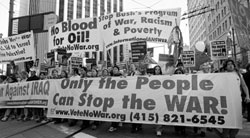UNITED NATIONS (IPS)–The unanimous vote in the UN Security Council supporting the U.S. resolution on weapons inspections in Iraq was a demonstration of Washington’s ability to wield its vast political and economic power, say observers.

“Only a superpower like the United States could have pulled off a coup like this,’’ said an Asian diplomat.
News Analysis
The unanimous 15-0 vote, he said, was obtained through considerable political and diplomatic pressure. The lobbying, he added, was not done at the United Nations, but in various capitals.
Besides its five veto-wielding permanent members–the United States, Britain, France, China and Russia–the Security Council also consists of 10 non-permanent, rotating members who hold office for two years.
France, China and Russia, in almost a single voice, said they decided to back the resolution because of assurances by the United States that it would return to the Security Council before launching a military attack on Iraq. The resolution, they argued, does not provide the United States with the automatic use of military force.
But the 10 non-permanent members–Cameroon, Guinea, Mauritius, Bulgaria, Colombia, Mexico, Singapore, Norway, Ireland and Syria–voted under heavy diplomatic and economic pressure from the United States.
Nine votes and no vetoes were the minimum needed to adopt the resolution. Of the five big powers, Britain had co-sponsored the U.S. resolution. In a worst-case scenario, U.S. officials were expecting the other three permanent members–Russia, China and France–to abstain on the vote.
That meant the votes of the 10 non-permanent members took on added significance. Of the 10, the two Western nations, Ireland and Norway, were expected to vote with the United States.
Syria, a “radical’’ Arab nation listed as a “terrorist state’’ by the U.S. State Department, was expected to either vote against or abstain.
So the arm-twisting was confined mostly to the remaining seven countries, who depend on the United States either for economic or military aid–or both.
All these countries were seemingly aware of the fact that in 1990 the United States almost overnight cut about $70 million in aid to Yemen immediately following its negative vote against a U.S.-sponsored Security Council resolution to militarily oust Iraq from Kuwait.
Before the vote, Mauritius UN ambassador Jagdish Koonjul was temporarily recalled by his government because he continued to convey the mistaken impression that his country had reservations about the U.S. resolution against Iraq.
“The Yemen precedent remains a vivid institutional memory at the United Nations,” said Phyllis Bennis, a fellow at the Washington-based Institute for Policy Studies.
Ms. Bennis said that just after that 1990 vote, the U.S. envoy turned to the Yemeni ambassador and told him that his vote would be “the most expensive ‘no’ vote you would ever cast.” The United States then promptly cut the entire $70 million in the U.S. aid budget for Yemen.
The latest incarnation of that reality, Ms. Bennis said, came from the island nation of Mauritius, which joined the Security Council last year under U.S. sponsorship. The U.S. aid package to the impoverished country, authorized by the U.S. African Growth and Opportunity Act (AGOA), demands that the aid recipient “does not engage in activities contrary to U.S. national security or foreign policy interests.”
Fear of being accused of acting contrary to U.S. foreign policy interests plays a role “not only for Mauritius, but also for any country dependent on U.S. economic assistance,” added Ms. Bennis.
Colombia, one of the world’s leading producers of cocaine and an important supplier of heroin to the U.S. market, received about $380 million in U.S. grants under the International Narcotics Control and Law Enforcement program this year. The proposed amount earmarked for 2003 is $439 million.
Under the same program, Mexico received about $10 million last year and $12 million this year. It also received $28.2 million in U.S. Economic Support Funds.
Guinea, another of the non-permanent members in the Security Council, received $3 million in outright U.S. military grants last year and is expected to get $20.7 million in development assistance next year.
Cameroon is not only entitled to receive free surplus U.S. weapons but also receives about $2.5 million in annual grants for military education and training.
After Colombia, the largest single beneficiary of U.S. aid is Bulgaria, which received $13.5 million in outright military grants (mostly to buy U.S. weapons systems) last year and an additional $8.5 million this year. The amount earmarked for 2003 is $9.5 million.
Additionally, Bulgaria has received $69 million in aid under a U.S. program called Support for East European Democracy. Next year’s proposed grant is $28 million.
Besides Syria, Singapore is the only country in the Security Council that does not receive economic or military aid from the United States. But the United States is the biggest single arms supplier to Singapore, selling the Southeast Asian nation weapons worth $656.3 million last year and an estimated $370 million this year.
Could any of these countries easily stand up to the United States or refuse to fall in line with their benefactor or military ally?
James Abourezk, a former U.S. senator, said he seriously doubts that any country receiving U.S. government aid could withstand the economic pressure to vote for a U.S. resolution at the Security Council.
“It would be a tragedy,” he said in an interview, “if a war were to be declared based on such pressure.”












